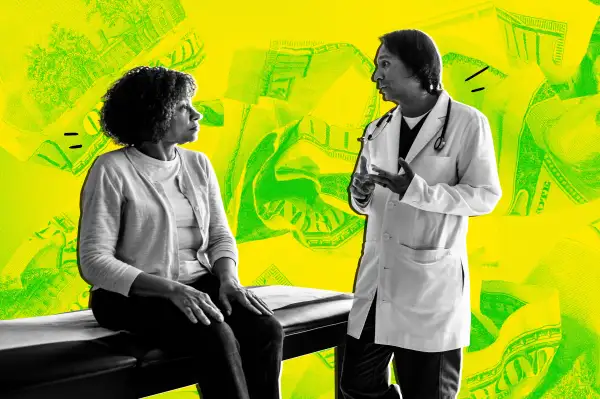Republicans and Democrats Agree: The Cost of Health Care Is a 'Very Big Problem'

Regardless of your political leanings, you probably agree with this statement: Health care costs are too high in the U.S.
Two-thirds of Americans now say the affordability of health care is a “very big problem in the country today,” according to a new survey from Pew Research in February, making it one of the top concerns in the minds of everyday citizens.
In fact, Americans are more concerned about the cost of health care than a wide range of political and economic issues, including inflation, drug addiction, gun violence, illegal immigration, racism and both domestic and international terrorism.
Overall, health care affordability is the second-highest concern, behind only the role of money in politics, which 72% of Americans also said is a “very big problem.” Inflation, at No. 3, is still on the minds of many, with 63% of respondents stating it’s a “very big” issue.
Concern over health care costs is no longer partisan
Pew has asked Americans about these issues several times before. Over the last few years, inflation has been the undisputed top concern. Before that, health care costs topped the list.
What’s notable this year, however, is the share of Americans across the political spectrum who are now concerned about health care costs. The last time health care affordability was the top-rated concern was 2021. Then, it was viewed as a more partisan issue: Only 40% of Republican-leaning respondents called it a “very big” problem, versus 69% of Democratic-leaning respondents.
The share of Republicans who are concerned with health care costs has ballooned since then, and Pew’s February survey shows the partisan gap is notably shrinking — with 61% of Republican-leaning Americans saying health care costs are a very big issue. On the other hand, 73% of Democratic-leaning respondents said the same.
President Donald Trump appears to have gotten the memo. On Tuesday, Trump signed an executive order intended to provide more transparency with health care costs. The order requires health insurers and hospitals to disclose the actual cost of care — not just estimates — online and in an easy-to-read format, building on rules from Trump's first term.
A 2023 study from the University of Minnesota found that, if fully implemented, such transparency measures could lower health care spending between $17 billion and $80 billion over a period of roughly two years.
Just how expensive is health care in the U.S.?
In the words of famed investor Warren Buffett: “Medical costs are the tapeworm of American economic competitiveness."
And if health care affordability were a competition, the U.S. would be losing to its peers on several fronts. According to the latest health care spending estimates from the federal government, the U.S. collectively spent $4.9 trillion on health care in 2023, amounting to roughly $14,600 per person.
That figure is far higher than in any other country in the world. According to a Money analysis of Organization for Economic Cooperation and Development (OECD) data, the U.S. spends 250% more per person on health care than the average of its peer countries. All that spending does not translate into healthier populations.
A separate analysis from the nonprofit Kaiser Family Foundation found that among the top 12 wealthiest OECD nations, the U.S. has the lowest life expectancy at 78.4, far below the average of 82.5.
By comparison, in Japan — which spends just 40% of what the U.S. does on health care per person — residents live to over 84 on average.
These discrepancies between the U.S. and other wealthy, developed countries have grown since the pandemic. And, as Pew's data shows, so has Americans' discontent.
More from Money:
'DOGE Dividends': Will You Actually Get a $5,000 Check From Trump?
New Medicare Rules Will Make Prescription Drugs a Lot Cheaper in 2025
